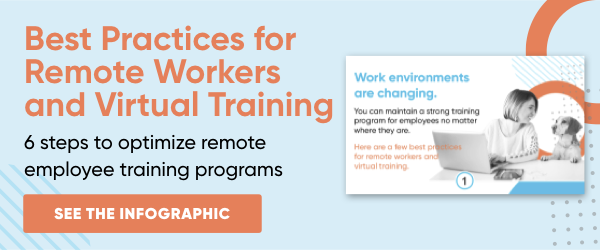Over the past couple of years, BYOD has become a major trend in the corporate sector. TrainingIndustry.com defined BYOD, which stands for “bring your own device,” as “the policy, practice or strategy of allowing learners to bring their own personal mobile devices to the training environment, including laptops, tablets, smartphones or some other form of technology that allows the learner to access the training content proprietary to that event.”1
BYOD is relevant because 67 percent of employees use personal devices at work and 87 percent of businesses are reliant upon their workers’ ability to access mobile business applications directly from their smartphone, per TechJury.2 By making BYOD part of their company culture, organizations will receive a myriad of benefits that will help them come through the COVID-19 pandemic successfully.

How BYOD Can Help Your Company During the
COVID-19 Pandemic
The coronavirus crisis is causing major financial damage to businesses of all types, making it difficult or impossible for employees to work and train from their regular office location, which can compromise cybersecurity for some organizations. COVID-19 has caused at least 100,000 small businesses in the U.S. to close, and many aren’t far behind.3 One of the ways BYOD will increase your organization’s odds of getting through the pandemic is by promoting mobile learning.
BYOD fosters mobile learning
As cases of COVID-19 spiked in the U.S. in early 2020, many employees worked from home for at least several weeks. But just because stay-at-home restrictions are being or have been lifted in many areas, that doesn’t mean all workers will return to the office.
“74 percent of those surveyed expect at least 5 percent of their workforce who previously worked in company offices will become permanent work-from-home employees after the pandemic ends,” according to CRN.4
Mobile learning, which allows employees to access company applications and eLearning courses from their personal devices, is vital to the success of organizations navigating the coronavirus crisis. It will also help businesses once COVID-19 is under control by continuing to enable employees to work and learn remotely, from their mobile devices.
BYOD promotes cost-savings and tightens cybersecurity
Another reason companies should prioritize BYOD immediately is because it can save them money. BYOD accomplishes this by preventing business leaders from purchasing learning devices that employees can supply for themselves. “BYOD generates $350 of value each year per employee,” stated TechJury.net.5 In a compromised economy, income generation and cost-savings are two great reasons for companies to adopt BYOD.
In addition to enabling mobile learning, saving companies money, and generating more revenue for organizations, BYOD can assist IT departments in increasing cybersecurity. “If you fail to embrace BYOD, it will continue to happen under your nose and with zero governance,” Business2Community.com explained. “That’s a far greater security risk, but put a BYOD policy in place, and you can set the rules.”6
Learn more: The Link Between BYOD and Increased Productivity
How to Create a BYOD Culture
At the heart of a BYOD company culture is a robust BYOD policy that is readily accessible to workers. To create an effective BYOD policy, try the following:
- Work with company leaders and your IT department to decide which specific personal devices and models are acceptable for employees to use to access company data. Create a document that lists these devices and make it easily accessible to your employees via Google docs or a learning management system, if you have one.
- Create a miniseries of training videos that cover best practices for keeping company data secure while accessing it from a personal device. An IT staff member may be willing to help with this.
- Create a BYOD sign-up process where employees can submit a request to register a device for BYOD through an IT ticket system. Make setup easier for BYOD participants by having a video ready that walks them through downloading and using your company’s specialized apps and interacting with your eLearning system and online courses on their personal device.
If you aren’t already using one, consider launching an online learning experience platform that promotes mobile learning and supports your company’s BYOD policy. You can launch an eLearning system in a matter of days with the TOPYX Quick Start Program.
Sources:
1.https://trainingindustry.com/glossary/byod-bring-your-own-device/
2. https://techjury.net/stats-about/byod/#gref
3.https://www.axios.com/small-businesses-coronavirus-closures-ea6b998e-2b83-407f-8b84-d958a3b2e268.html
4. https://www.crn.com/news/running-your-business/some-may-work-from-home-permanently-after-covid-19-gartner
5. https://techjury.net/stats-about/byod/#gref
6. https://www.business2community.com/tech-gadgets/instilling-byod-culture-business-best-move-make-01578761








